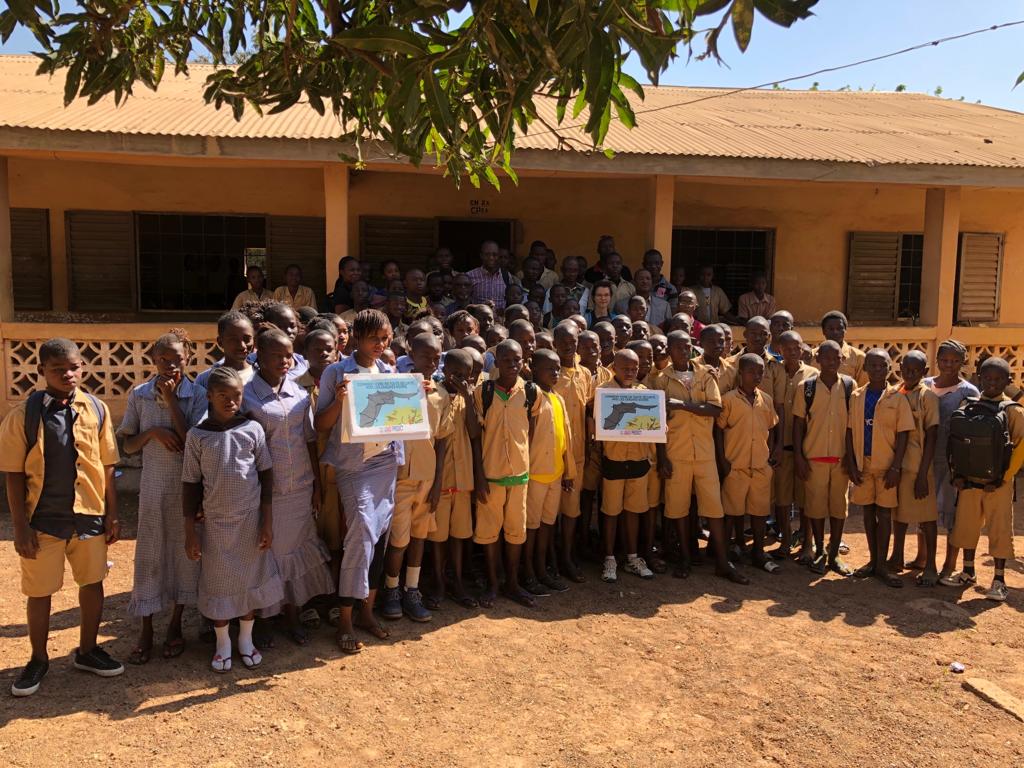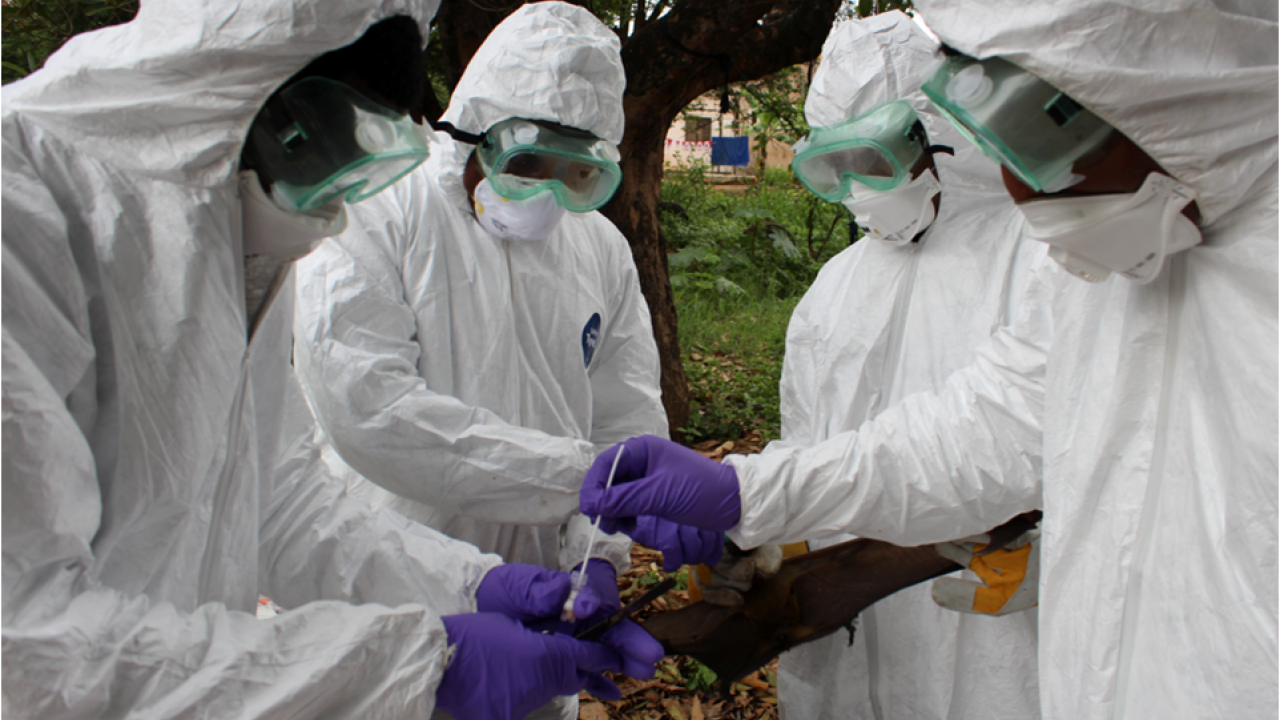PREDICT is training students and professionals in One Health skills, empowering country-led teams to prevent and respond to epidemic and pandemic threats
At UC Davis, the One Health Institute has been integral in global surveillance for zoonotic viruses through its leadership of PREDICT, a collaborative international project funded by the U.S. Agency for International Development (USAID) to find pathogens before they spill over into humans.
PREDICT has been working for almost 10 years with more than 30 countries throughout Africa, Asia and Latin America, using the One Health approach to investigate the behaviors, practices, and ecological and biological factors driving viral emergence, transmission and spread.
A key aspect of PREDICT is capacity strengthening—collaborating with governments at the regional, national and local levels to reinforce their health security infrastructure and train students and professionals in One Health skills to prevent and respond to pandemic threats.
Here are 5 ways that PREDICT is strengthening global health security in Africa and Asia by empowering a One Health approach to workforce development:
1. We’re providing One Health training for health and environmental workers to protect people and gorillas from Ebola in DR Congo.

PREDICT partner and UC Davis-led Gorilla Doctors, an international team dedicated to conserving wild mountain and eastern lowland gorillas, recently brought together a group of frontline workers in Goma for a workshop on Ebola disease monitoring and control using a One Health approach.
DR Congo is currently battling a devastating Ebola outbreak. The response began in August 2018 and has documented 1,994 cases and 1,339 deaths as of June 1, 2019, according to the Centers for Disease Control (CDC). Treatment and vaccine administration are ongoing, but response has been hampered by many challenges. including ongoing political unrest and tension around a national presidential election.
Because Ebola is a threat to humans and gorillas (one of the greatest threats to gorillas is disease transmission from humans), PREDICT and the Gorilla Doctors have been actively engaged in the response to this outbreak, supporting response plans and working closely with local communities and national parks to monitor and protect the health of this critical species.
Gorilla Doctors plans to repeat this workshop with local universities and key stakeholders throughout the region and to conduct educational outreach in local communities.
2. We're mentoring scientists in West Africa to identify the hosts of filoviruses, like Ebola, and work with communities to reduce the risk of transmission.

Following the 2013-2016 Ebola outbreak—which killed more than 11,000 people in West Africa—USAID, PREDICT and partners in Guinea, Liberia and Sierra Leone initiated the PREDICT Ebola Host Project. The project seeks to identify the range of animal hosts of filoviruses, which includes Ebola and its cousin, Marburg virus, as well as behavioral risks that could be associated with human infection.
The Ebola Host Project team has collected more than 55,000 samples from bats, rodents and other wildlife, resulting in three major discoveries: a new ebolavirus species, Bombali ebolavirus, found in insectivorous bats roosting inside people’s houses in Sierra Leone; Marburg virus in fruit bats in Sierra Leone, the first time this deadly virus has been detected west of Gabon in Africa; and Zaire ebolavirus in a insectivorous bat in Liberia.
PREDICT has also been working to equip One Health teams in this region with the social science skills needed to investigate behavioral risks linked to viral spillover and then deploy strategies for changing risky behaviors for the benefit of conservation and health.
For example, one way that teams are promoting safe practices, raising awareness and dispelling rumors in local communities is through the use of Living Safely with Bats, an educational resource designed by PREDICT.
To date, we have trained 358 scientists through the Ebola Host Project in One Health skills and techniques for sampling wildlife, testing samples for filoviruses, and in social science methods for exploring behavioral risks.
3. We help train the national One Health workforce in Tanzania to strengthen zoonotic disease surveillance capabilities.

Since 2009, our PREDICT team in Tanzania has been working with workers on the front lines of the national health system, conducting hands-on trainings in core One Health skills for staff in the veterinary, human health, wildlife and environmental sectors.
This collaborative, experiential-focused approach to workforce training, an essential element of PREDICT’s capacity strengthening plans across all countries, helps break down silos of communication and enhance problem solving. Ultimately, the training contributes to readiness and response capabilities for newly emerging diseases or outbreaks of unknown origin.
4. We connect students with One Health careers in Cambodia through internships, fellowships and hands-on experience.

Recent university graduates Ms. Chanthen Van and Ms. Leakhena Phum joined our PREDICT/Cambodia team and gained critical experience in the One Health approach to conduct disease surveillance and detection. They worked with our team in both field and laboratory settings while finishing their studies in bio-engineering and veterinary science, respectively.
With supervision from our scientists based at the Institut Pasteur du Cambodge (IPC), Chanthen and Leakhena completed their final-year research theses on coronaviruses in rodents and bats in Cambodia. Now laboratory technicians at IPC, they apply their One Health skills each day, testing samples for potentially deadly viruses and helping the Government of Cambodia discover disease outbreaks.
5. We put disease detection skills in action during a dramatic cave rescue in Thailand.

Who wasn’t captivated last June by the story of twelve Thai soccer players and their coach trapped in the Tham Luang Nang Non cave for nearly three weeks before a miraculous rescue through submerged caverns?
Even after rescue, a potential threat to the team’s health still loomed. Caves are often home to bats, rodents, insects and other hosts that harbor a wide variety of infectious pathogens. And being trapped in a cave, without any access to food or proper source of water can compromise the immune system and increased an individual’s susceptibility to infections.
The Thai government and the Ministry of Public Health (MOPH) called upon our PREDICT team, based at Chulalongkorn University, to assist with the rescued team’s health evaluations. Our team, which has been working since 2009 to help strengthen Thailand’s national surveillance and disease detection systems, advised MOPH staff on safe collection of specimens for viral screening. Then they tested the specimens for infectious pathogens using PREDICT’s viral detection platform, which can identify both known and new disease threats.
Fortunately, none of the rescued team members tested positive for any viruses related to the cave and resident wildlife hosts.
